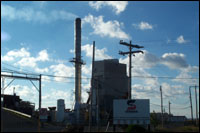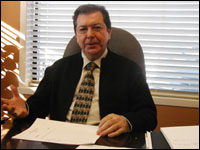Toxic waste products heading for Mercier
The Clean Harbors Society (known in the past as Tricil, Laidlaw and Safety Kleen) incinerator in Mercier is in the midst of receiving over 1,000 tonnes of toxic mud originating from Nova Scotia. Citizens are getting worried and environment groups are mobilizing themselves. In fact, four trucks have already delivered their load at the Mercier site.
 “This is not the NIMBY (not in my back yard) syndrome,” says Mercier resident Jeannine Brault, a community activist. “Instead, it’s ‘my yard is full (of pollution), so go somewhere else.’ Before decontaminating sites in other parts of Canada, we should start decontaminating here.”
“This is not the NIMBY (not in my back yard) syndrome,” says Mercier resident Jeannine Brault, a community activist. “Instead, it’s ‘my yard is full (of pollution), so go somewhere else.’ Before decontaminating sites in other parts of Canada, we should start decontaminating here.”
For the past week she has been knocking on the doors of Chateauguay MNA Jean-Marc Fournier; the Environment Ministry, and the Public Health department.
“We are always the last people informed when we are the ones suffering from what is burned in that incinerator,” she pointed out. “We want Quebec to issue an injunction. We want to be certain there is no danger to our health.”
The hazardous wastes will be transported to Quebec during the next few months by tanker trunk. The mud consists of oil residue from coal tar, a thick, black liquid which comes from ponds of tar surrounding the Sydney Steel plant in Sydney, N.S.
It is estimated that between 25 and 30 trips by specialized tanker trucks will be necessary to transport these substances from Sydney to Mercier. The incineration of this sludge will be done over a two-month period.
The Mercier Decontamination Coalition, which consists of several groups asking for the decontamination of the old Mercier lagoons (where the incinerator is situated), is preparing to write to Premier Jean Charest and to the Montérégie Public Health department.
“We are very worried and we are firmly opposed to the transfer of these waste products to Mercier for several reasons,” said Coalition co-ordinator Michel Préville, an ex-journalist.
The Coalition is putting in doubt the incinerator’s effectiveness. “It is out of date,” Préville claims. “We are far from convinced that the incineration of this sludge will not produce hazardous toxic residues for the Mercier population and the surrounding area.
“One can also ask oneself why these substances are not burned directly at the site in Sydney,” he noted, logically. “Today there are mobile incinerators in existence which are otherwise more efficient and safe than the one in Mercier. In addition, this type of incinerator is dismantled when the work is over and the general public is not stuck with it.
“The people of Sydney did not want to have this stuff incinerated in their city, and neither did those living in Sarnia, Ont. Why must Mercier residents accept it?” he asks.
Please Note: In a phone call to Michel Préville of the Mercier
Decontamination Coalition (Aug. 27), Dan McMullin was told that the article segment above
is a mis-quote. Mr. Préville clarified that his group in fact " ...opposes incineration
at Mercier or any other location in any province including Nova Scotia". We wish them well
in their ongoing struggle with Clean Harbors and both provincial and federal authorities
to address their long-standing concerns. Watch on this site for future articles
about Mercier, Quebec.
For the coalition, these first 1,000 tonnes would only be the tip of the iceberg. “There are another 700,000 tonnes waiting in the wings,” Préville informed. “By permitting the incineration of the first 1,000 tonnes, we are opening the door,” he fears.
“We want to inform the population that we are following this affair on a daily basis,” said Mercier Mayor Jean-Luc Colpron.
“As soon as we were informed of the dossier last Aug. 14, we did some research and we obtained all the necessary information.
 “I have already had several meetings and discussions with people from Clean Harbors and the Environment Ministry,” he disclosed. “I am assured that everything conforms with the regulations in place. Town Council will meet representatives from the Ministry and the company during the next few days. We want to have the assurance that the public has nothing to fear.”
“I have already had several meetings and discussions with people from Clean Harbors and the Environment Ministry,” he disclosed. “I am assured that everything conforms with the regulations in place. Town Council will meet representatives from the Ministry and the company during the next few days. We want to have the assurance that the public has nothing to fear.”
According to Colpron, this is not the first contract of this type carried out at the Mercier incinerator. “Clean Harbors officials told me that they regularly burn tar oils. They assure me, as do Environment Ministry specialists, that these residues do not contain PCBs.
“I can therefore assure residents that if we ever see irregularities developing, we will live up to our responsibilities and make the necessary interventions,” the Mayor vowed.
At Fournier’s office, officials are closely monitoring the situation. Numerous calls have been made to the Environment Ministry, the Public Health department and the Transport Ministry. Each submits that everything is being done according to the rules.
According to the Clean Harbors Society, there is no reason for concern. “This is not the first time we are burning this type of material,” said vice-president Guy Adam. “There will be no consequences for the environment,” he promised a Montreal daily.(Tr:D.R.)
|
 “This is not the NIMBY (not in my back yard) syndrome,” says Mercier resident Jeannine Brault, a community activist. “Instead, it’s ‘my yard is full (of pollution), so go somewhere else.’ Before decontaminating sites in other parts of Canada, we should start decontaminating here.”
“This is not the NIMBY (not in my back yard) syndrome,” says Mercier resident Jeannine Brault, a community activist. “Instead, it’s ‘my yard is full (of pollution), so go somewhere else.’ Before decontaminating sites in other parts of Canada, we should start decontaminating here.” “I have already had several meetings and discussions with people from Clean Harbors and the Environment Ministry,” he disclosed. “I am assured that everything conforms with the regulations in place. Town Council will meet representatives from the Ministry and the company during the next few days. We want to have the assurance that the public has nothing to fear.”
“I have already had several meetings and discussions with people from Clean Harbors and the Environment Ministry,” he disclosed. “I am assured that everything conforms with the regulations in place. Town Council will meet representatives from the Ministry and the company during the next few days. We want to have the assurance that the public has nothing to fear.”